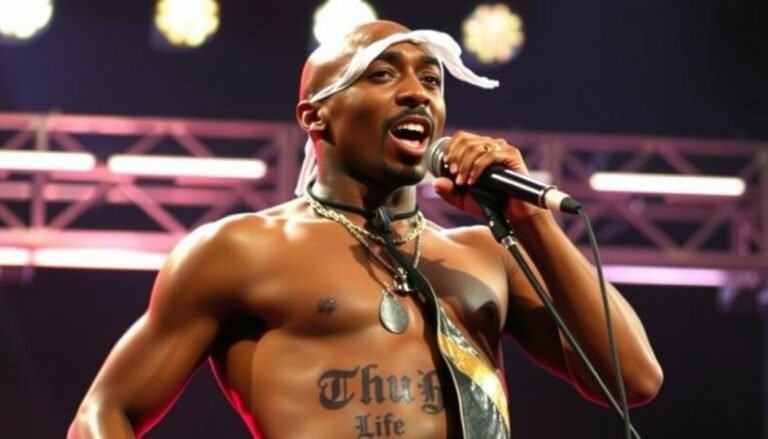Michael Jackson: The Eternal King of Pop – Legacy, Career & Cultural Impact
Few artists have shaped the landscape of popular music and global culture as profoundly as Michael Jackson. From his early days as the charismatic child prodigy fronting the Jackson 5 to his evolution into the “King of Pop,” Jackson’s influence transcended music to impact dance, fashion, video production, and humanitarian efforts worldwide. His unparalleled talent and innovative spirit forever changed the entertainment industry, breaking racial barriers and setting new standards for artistic excellence.
This article explores Michael Jackson’s extraordinary journey, examining his groundbreaking achievements, signature style, philanthropic work, and the complex legacy that continues to resonate years after his passing. Whether you’re a lifelong fan or discovering his genius for the first time, join us as we celebrate the artist who gave the world “Thriller,” the moonwalk, and a musical legacy that remains unmatched in its global impact and enduring popularity.
Early Life and Career Milestones: The Making of a Legend
Born on August 29, 1958, in Gary, Indiana, Michael Joseph Jackson was the eighth of ten children in the Jackson family. Under the strict guidance of his father, Joseph Jackson, Michael began performing professionally at the remarkably young age of six as part of the Jackson 5, alongside his brothers Jackie, Tito, Jermaine, and Marlon.
The Jackson 5 quickly rose to fame after signing with Motown Records in 1968. Their first four singles—”I Want You Back,” “ABC,” “The Love You Save,” and “I’ll Be There”—all reached number one on the Billboard Hot 100, an unprecedented achievement that announced the arrival of a musical phenomenon. Even within this talented group, Michael’s extraordinary vocal abilities and natural stage presence made him stand out as a special talent.
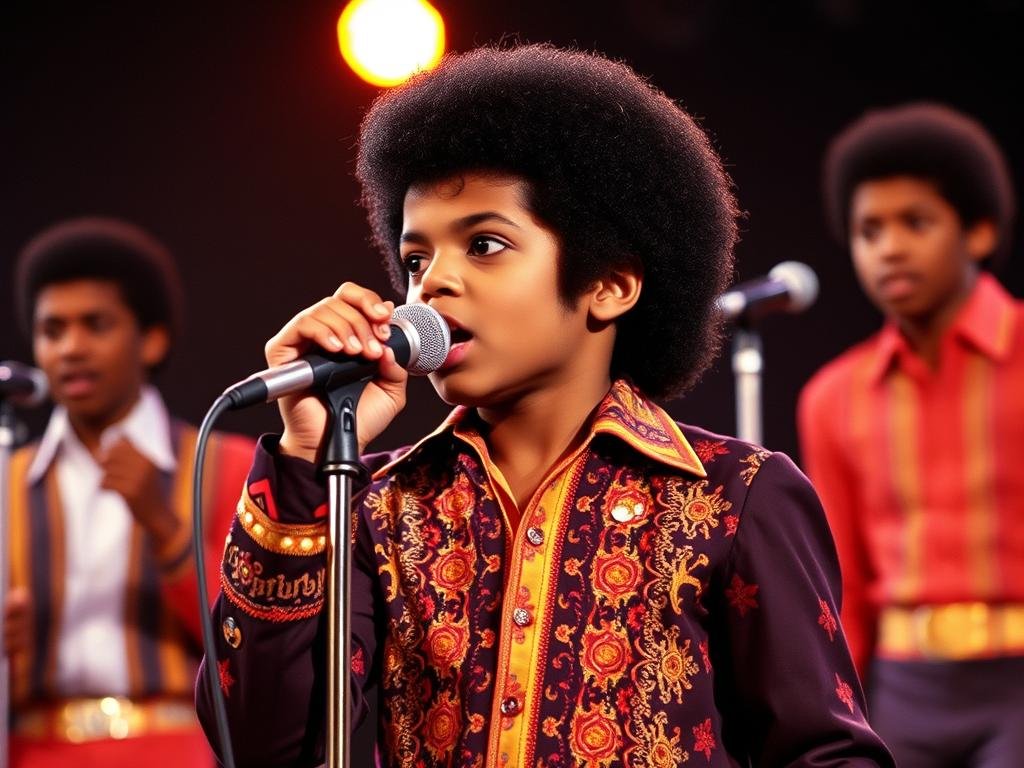
While still performing with his brothers, Michael began his solo career in 1971 with the release of “Got to Be There.” However, it was his fifth solo album, Off the Wall (1979), that truly established him as a solo artist of remarkable potential. Produced by Quincy Jones, the album showcased Michael’s evolving artistic vision and versatility, blending disco, funk, pop, soul, and R&B into a fresh, distinctive sound.
Off the Wall (1979)
Michael Jackson’s first solo album with Epic Records marked his transition to adult stardom. Working with producer Quincy Jones, Jackson created a groundbreaking fusion of disco, R&B, funk, and pop that would define his early solo sound.
- Sold over 20 million copies worldwide
- Produced four Top 10 singles in the US
- First solo artist to have four singles from the same album reach the Top 10
- Won a Grammy Award for “Don’t Stop ‘Til You Get Enough”
Key Singles
The album’s success was driven by its chart-topping singles that showcased Jackson’s evolving sound and established him as a solo force in the music industry.
- “Don’t Stop ‘Til You Get Enough” – Grammy winner for Best Male R&B Vocal Performance
- “Rock with You” – Reached #1 on the Billboard Hot 100
- “Off the Wall” – Showcased Jackson’s maturing vocal style
- “She’s Out of My Life” – Demonstrated his emotional depth as a vocalist
Cultural Impact
Beyond its commercial success, Off the Wall represented a pivotal moment in popular music history and in Michael Jackson’s artistic development.
- Helped break down racial barriers in the music industry
- Established Jackson’s signature sound that would evolve on later albums
- Demonstrated his transition from child star to adult artist
- Set the stage for his future collaborations with Quincy Jones
Off the Wall sold over 20 million copies worldwide and yielded four US top-ten hits: “Don’t Stop ‘Til You Get Enough,” “Rock with You,” “Off the Wall,” and “She’s Out of My Life.” The album’s success established Michael as a solo superstar and set the stage for what would become the biggest album in music history.
Experience the Magic of Off the Wall
Rediscover the album that launched Michael Jackson’s solo career into the stratosphere. Listen to the groundbreaking fusion of disco, funk, and pop that changed music forever.
How Did Thriller Revolutionize the Music Industry?
Released on November 30, 1982, Thriller wasn’t just an album—it was a cultural phenomenon that redefined what was possible in popular music. Produced once again by Quincy Jones, Thriller built upon the foundation laid by Off the Wall but with even greater ambition, diversity, and innovation.
The numbers alone tell an extraordinary story: Thriller has sold an estimated 70 million copies worldwide, making it the best-selling album of all time. It spent an unprecedented 37 weeks at number one on the Billboard 200 and generated an astounding seven top-ten singles on the Billboard Hot 100—a record that still stands today.
“In the world of pop music, there is Michael Jackson and there is everybody else. The numbers, the musical innovation, the dancing, the videos, the live performances, the cultural impact—in every category, he simply stands alone.”
But Thriller‘s impact extended far beyond record sales. The album and its accompanying videos—particularly the groundbreaking 14-minute “Thriller” short film directed by John Landis—transformed music video from a promotional tool into an art form. MTV, which had been reluctant to play videos by Black artists, couldn’t ignore the brilliance of “Billie Jean,” “Beat It,” and “Thriller,” helping to break down racial barriers in the music industry.
The album’s musical diversity was equally revolutionary. From the hard rock of “Beat It” (featuring Eddie Van Halen’s guitar solo) to the danceable pop of “Wanna Be Startin’ Somethin'” to the R&B smoothness of “Human Nature,” Thriller refused to be confined by genre boundaries. This cross-genre appeal helped Michael Jackson reach audiences across racial, geographic, and cultural divides, truly making him a global superstar.
| Single | Release Date | Billboard Hot 100 Peak | Notable Achievement |
| “The Girl Is Mine” (with Paul McCartney) | October 18, 1982 | #2 | Collaboration between two music legends |
| “Billie Jean” | January 2, 1983 | #1 (7 weeks) | Iconic moonwalk debut on Motown 25 |
| “Beat It” | February 14, 1983 | #1 (3 weeks) | Eddie Van Halen guitar solo, rock/pop crossover |
| “Wanna Be Startin’ Somethin'” | May 8, 1983 | #5 | Influenced countless artists with its rhythm |
| “Human Nature” | July 4, 1983 | #7 | Written by Steve Porcaro of Toto and John Bettis |
| “P.Y.T. (Pretty Young Thing)” | September 19, 1983 | #10 | Co-written by James Ingram |
| “Thriller” | January 23, 1984 | #4 | Revolutionary 14-minute music video |
At the 1984 Grammy Awards, Thriller won a record-breaking eight awards, including Album of the Year. Michael Jackson had not only created the best-selling album of all time but had also changed the music industry forever, elevating the artistic possibilities of pop music and setting a standard that artists still aspire to today.
Witness the Performance That Changed Music History
Watch Michael Jackson’s legendary Motown 25 performance where he debuted the moonwalk during “Billie Jean” – a moment that stunned the world and cemented his status as the King of Pop.
The Revolutionary Dance Style of Michael Jackson
Michael Jackson’s impact on dance is as significant as his contributions to music. His innovative movements, precision, and unique style transformed dance in popular culture and influenced generations of performers. From the robot to the moonwalk to the anti-gravity lean, Jackson created and popularized moves that became instantly recognizable worldwide.
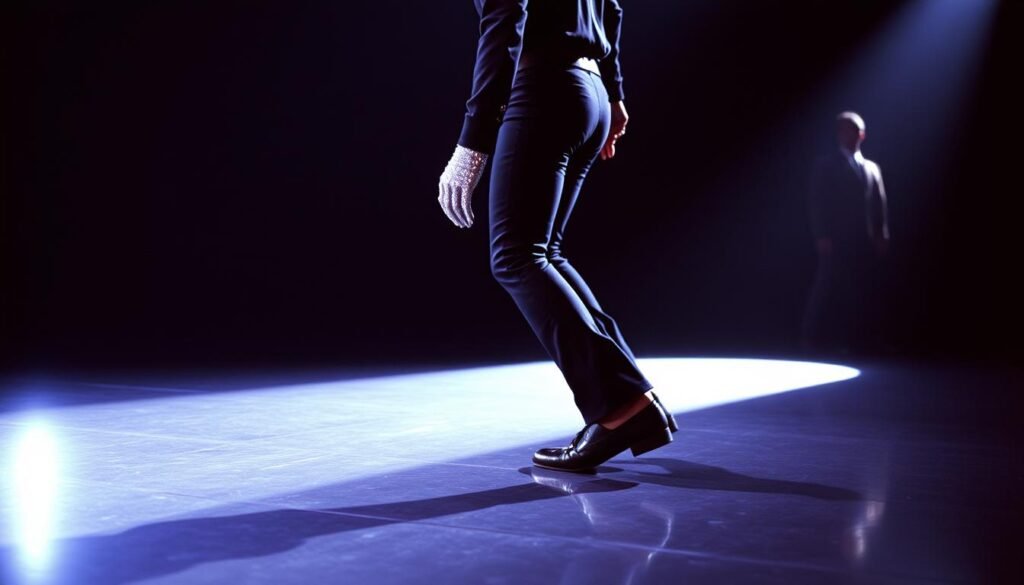
The Moonwalk: Redefining Dance Overnight
While Michael Jackson didn’t invent the moonwalk (earlier versions existed in dance communities), he perfected and popularized it to an unprecedented degree. When he performed the move during “Billie Jean” at the Motown 25 television special on March 25, 1983, it created an instant sensation. The seemingly impossible backward glide became his signature move and one of the most recognizable dance steps in history.
Jackson learned the moonwalk from street dancers including Jeffrey Daniel of the group Shalamar, but he transformed it with his precision and showmanship. The move became so associated with Jackson that many people still believe he invented it—a testament to how completely he made it his own.
Signature Dance Moves
- The Robot – Mechanical, precise movements that Jackson performed as early as the 1970s with the Jackson 5
- The Moonwalk – The backward gliding step that became his most iconic move
- The Anti-Gravity Lean – Featured in “Smooth Criminal,” this seemingly impossible 45-degree forward lean required special shoes with ankle slots that locked onto pegs on the stage
- The Toe Stand – Rising up on the tips of his toes and holding the position, showcasing his strength and balance
- The Spin – Rapid, multiple rotations executed with perfect control
- The Kick – Sharp, precise kicks incorporated into his choreography
- The Crotch Grab – A controversial but distinctive move that became part of his performance vocabulary
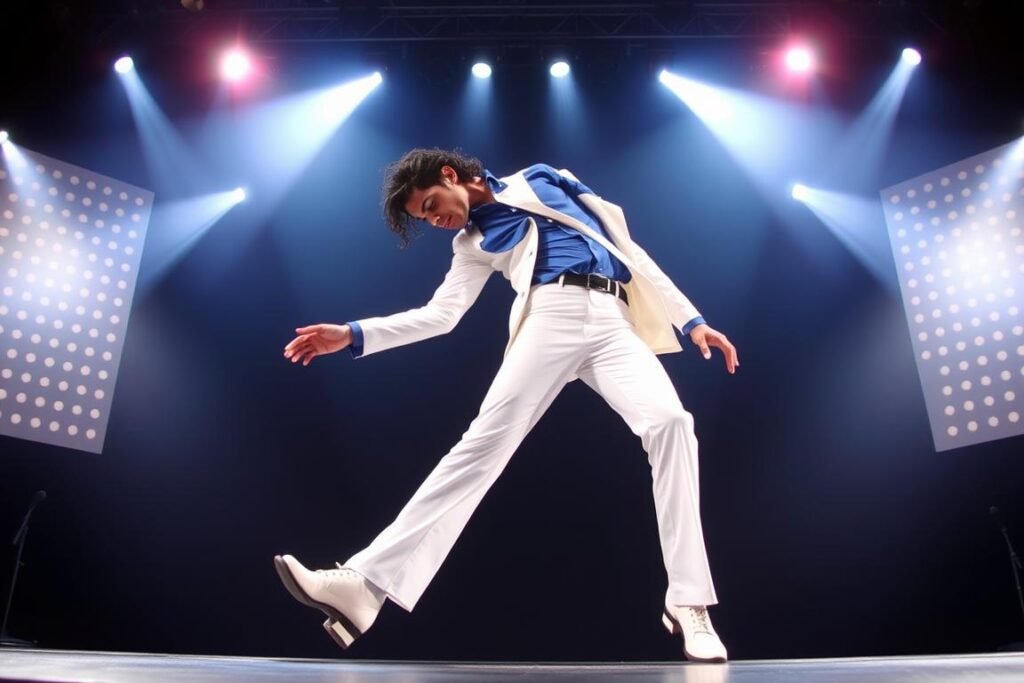
Jackson’s dancing was characterized by its precision, sharpness, and emotional expressiveness. He could isolate different parts of his body, creating visual effects that seemed almost superhuman. His movements were both fluid and mechanical, soft and aggressive, combining elements from various dance traditions into something entirely his own.
Fashion Evolution: Creating an Iconic Visual Identity
Michael Jackson’s fashion choices were as revolutionary as his music and dance. His evolving style became an integral part of his artistic expression and cultural impact, creating instantly recognizable looks that defined eras of his career.
Early Solo Career (1979-1983)
- Tailored suits with bow ties
- Afro hairstyle transitioning to jheri curls
- Introduction of the single white glove
- Loafers with white socks
- Aviator sunglasses
Thriller/Bad Era (1983-1987)
- Red leather “Thriller” jacket
- Military-inspired jackets with gold details
- The iconic white sequined glove
- Black fedora hat
- Zippered leather jackets
- Armband accessories
Later Career (1988-2009)
- Gold and silver military-inspired outfits
- Embellished armbands and belts
- Straight, longer hairstyles
- White V-neck t-shirts with black pants
- Surgical masks and face coverings
- Custom-designed performance costumes
Jackson’s fashion choices weren’t merely aesthetic—they were carefully crafted elements of his artistic persona. The single white sequined glove, for instance, drew attention to his hand movements during performances, highlighting his intricate choreography. His military-inspired jackets reflected both his disciplined approach to performance and his message of unity and change.
Designers who created looks for Jackson included Bill Whitten (who designed the original rhinestone glove), Michael Bush and Dennis Tompkins (who created many of his stage costumes), and high-fashion designers like Givenchy and Balmain. His style influenced fashion worldwide and continues to inspire designers and performers today.
Learn the King of Pop’s Signature Moves
Want to dance like Michael Jackson? Watch this comprehensive tutorial that breaks down his most iconic moves, from the moonwalk to the robot.
Philanthropy and Humanitarian Efforts: Michael Jackson’s Legacy of Giving
Beyond his artistic achievements, Michael Jackson was deeply committed to humanitarian causes throughout his life. His philanthropic work, often overshadowed by his musical accomplishments and personal controversies, represents a significant part of his legacy and reflects his genuine desire to make a positive impact on the world.

Jackson’s charitable giving was extensive and diverse. According to various estimates, he donated over $500 million to charity during his lifetime, supporting more than 39 charitable organizations. The Guinness Book of World Records recognized him as the pop star who supported the most charities.
The Heal the World Foundation
In 1992, Jackson founded the Heal the World Foundation, an organization dedicated to improving the lives of children worldwide. The foundation provided medicine to children in need, fought child hunger and homelessness, and worked to raise awareness about children’s rights. It also organized relief efforts for children in war-torn regions and areas affected by natural disasters.
Through the Heal the World Foundation, Jackson funded numerous initiatives, including:
- Airlifting 46 tons of supplies to Sarajevo during the Bosnian War
- Providing financial assistance to children affected by the 1994 Northridge earthquake in California
- Supporting drug prevention programs in various countries
- Funding immunization programs for children in developing nations
- Establishing educational programs focused on cultural understanding and conflict resolution
Major Charitable Contributions
- “We Are the World” (1985) – Co-wrote this charity single with Lionel Richie, which raised over $63 million for famine relief in Africa
- United Negro College Fund – Donated $1.5 million and established a scholarship fund
- Make-A-Wish Foundation – Granted numerous wishes for children with life-threatening illnesses
- Elizabeth Taylor AIDS Foundation – Supported his friend Elizabeth Taylor’s organization with substantial donations
- Childhelp USA – Contributed to this organization dedicated to the prevention and treatment of child abuse
- Children’s Defense Fund – Supported this child advocacy organization throughout his career
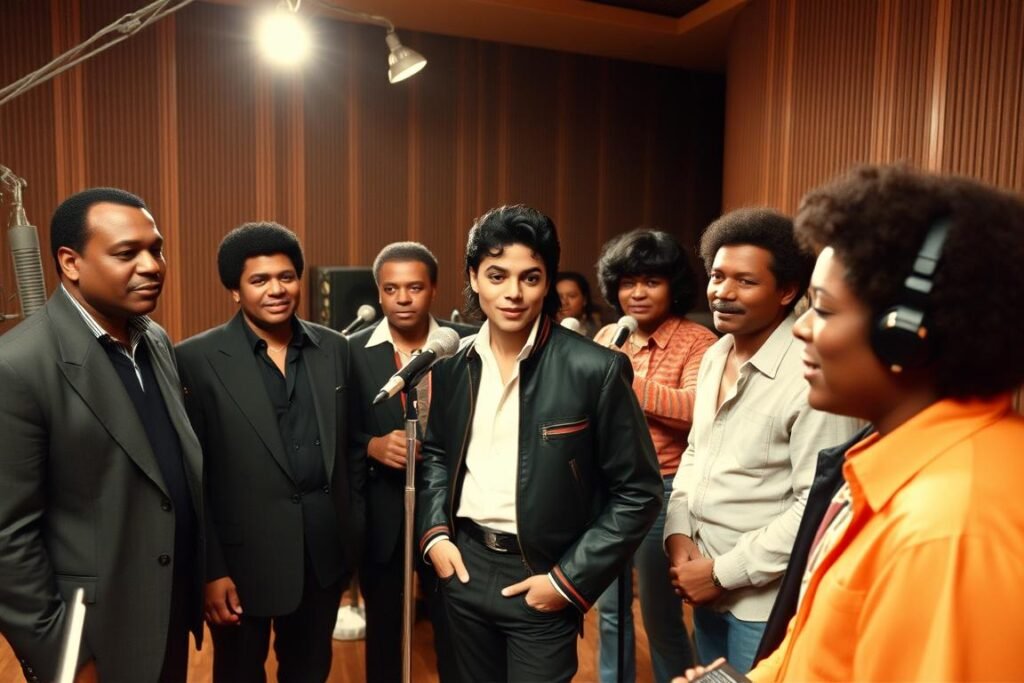
Jackson’s Neverland Ranch, while controversial in some respects, was also an extension of his philanthropic vision. He regularly invited disadvantaged and terminally ill children to visit the ranch and enjoy its amusement park, zoo, and movie theater free of charge. Thousands of children visited Neverland over the years, experiencing a day of joy and escape from their difficulties.
“My goal in life is to give to the world what I was lucky to receive: the ecstasy of divine union through my music and my dance. There is no question about my dedication to every note of music I create. Love, peace and giving—that’s what I want to leave behind.”
Jackson’s humanitarian efforts were recognized with numerous awards, including the Grammy Legend Award, the American Music Award’s Artist of the Century, and the World Music Award’s Best-Selling Pop Male Artist of the Millennium. In 2000, the Guinness World Records recognized him for supporting 39 charities, more than any other entertainer.
Despite the controversies that sometimes overshadowed his charitable work, Michael Jackson’s commitment to helping others—particularly children—remains an important part of his legacy. His genuine concern for the welfare of children worldwide and his generous financial contributions have made a lasting positive impact on countless lives.
Experience “We Are the World”
Watch the historic recording of “We Are the World,” co-written by Michael Jackson and Lionel Richie, featuring 45 American artists united to raise funds for African famine relief.
What Impact Did Controversies Have on Michael Jackson’s Legacy?
Michael Jackson’s life and career were marked by extraordinary achievements but also by significant controversies that continue to affect how his legacy is perceived. These controversies, particularly the allegations of child sexual abuse that emerged in the 1990s and 2000s, created a complex and sometimes contradictory public image that has been debated extensively since his death in 2009.
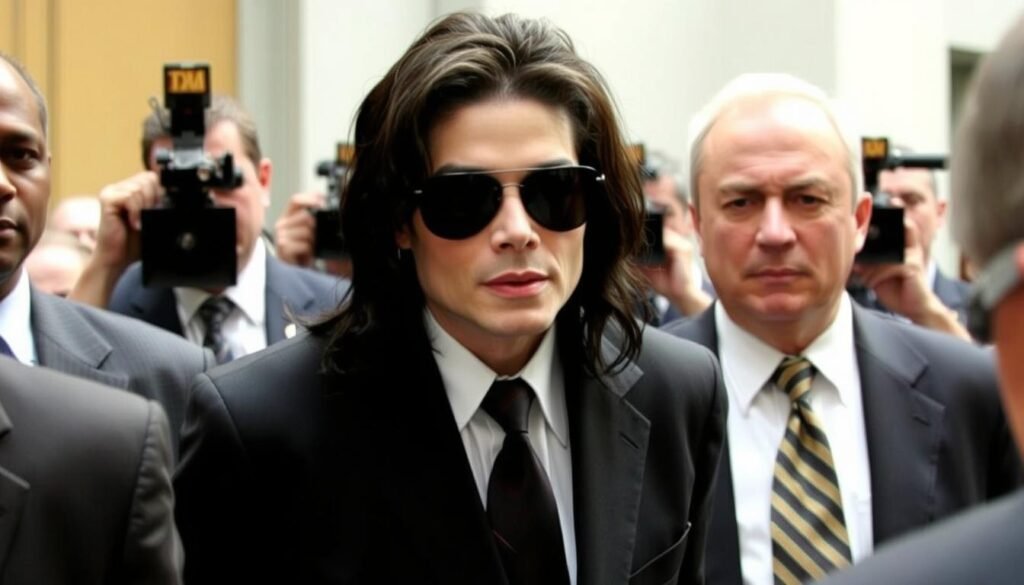
The 1993 Allegations
In August 1993, Jackson was accused of sexually abusing a 13-year-old boy named Jordan Chandler. The case never went to criminal trial, as Jackson settled a civil lawsuit brought by the Chandler family in January 1994 for a reported $15-25 million. Jackson and his legal team maintained that the settlement was not an admission of guilt but rather a decision to avoid a lengthy and public legal process that would interfere with his career and health.
The 1993 allegations marked a turning point in Jackson’s public image. Media coverage became increasingly negative, and his eccentric lifestyle—including his relationship with his pet chimpanzee Bubbles, his changing physical appearance, and his Neverland Ranch—came under intense scrutiny. Despite the settlement, no criminal charges were filed after two separate grand juries found insufficient evidence to indict Jackson.
The 2005 Trial
In 2003, following the broadcast of Martin Bashir’s documentary “Living with Michael Jackson,” in which Jackson was shown holding hands with a young boy and discussing sharing his bedroom with children, a new investigation was launched. In December 2003, Jackson was charged with seven counts of child molestation and two counts of administering an intoxicating agent to a minor.
The trial began in January 2005 and lasted until June of that year. After a highly publicized legal process, Jackson was acquitted of all charges. The jury found that the prosecution had not proven its case beyond a reasonable doubt. However, the trial took a significant toll on Jackson’s health, finances, and public image.
Physical Transformation and Health Speculation
Another source of controversy was Jackson’s changing physical appearance over the years, particularly his lightening skin tone. Jackson revealed in a 1993 interview with Oprah Winfrey that he suffered from vitiligo, a condition that causes loss of skin pigmentation. He explained that he used fair-colored makeup to even out his skin tone where the condition had caused patchy discoloration.
Despite this explanation, speculation about skin bleaching and extensive plastic surgery continued throughout his career. Jackson acknowledged having had two rhinoplasty procedures and a cleft chin surgery but denied most other plastic surgery rumors. After his death, his autopsy confirmed that he did indeed have vitiligo.
Jackson’s health was also the subject of much speculation, with reports of various medical issues including lupus, prescription drug dependency, and anorexia nervosa. These health concerns were exacerbated by the stress of his legal troubles and the demands of his career.
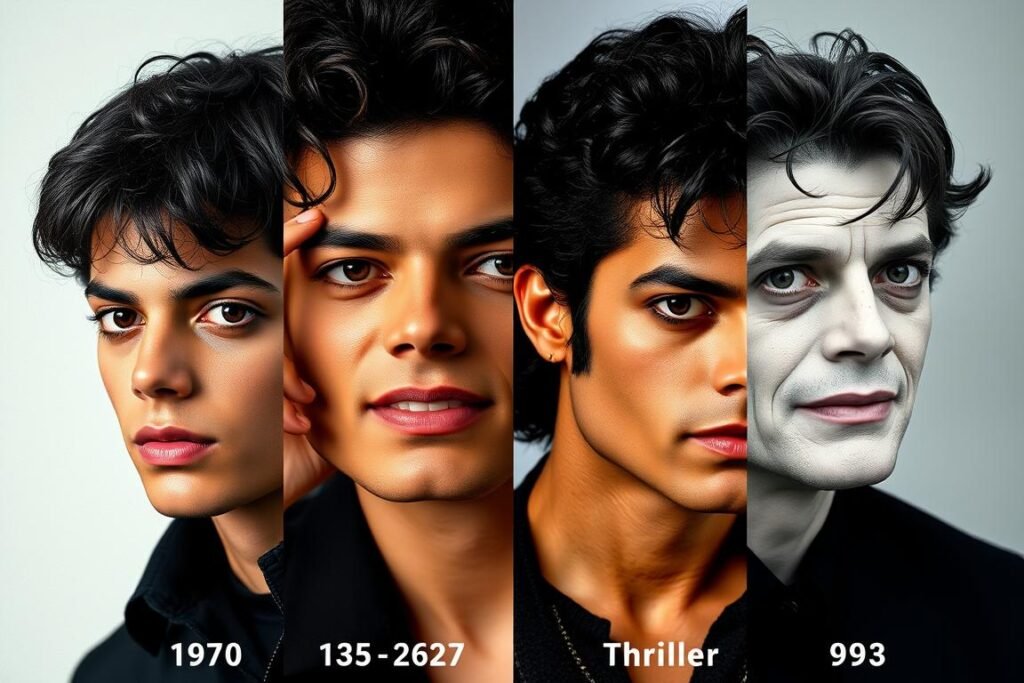
Financial Difficulties
Despite being one of the highest-earning entertainers in history, Jackson faced significant financial problems in his later years. His lavish lifestyle, legal expenses, and declining record sales contributed to mounting debt. By the time of his death, he was reportedly hundreds of millions of dollars in debt, though his estate has since become highly profitable through careful management of his musical catalog and other assets.
Posthumous Allegations
In 2019, the documentary “Leaving Neverland” featured two men, Wade Robson and James Safechuck, who alleged that Jackson had sexually abused them as children. The documentary reignited debates about Jackson’s legacy and led some radio stations and other entities to stop playing his music. However, Jackson’s estate vehemently denied the allegations and filed a $100 million lawsuit against HBO for violating a non-disparagement clause from a 1992 contract.
The documentary and subsequent discussions highlighted the ongoing challenge of separating the artist from the art—a question that continues to be debated with regard to Jackson and other controversial figures in entertainment and cultural history.
A Complex Legacy
The controversies surrounding Michael Jackson have created a complex legacy that is difficult to evaluate definitively. While some fans and critics choose to focus exclusively on his artistic achievements, others find it impossible to separate his work from the allegations against him. The debate reflects broader cultural conversations about how to assess the legacies of controversial figures and whether it’s possible or appropriate to separate artistic contributions from personal conduct.
What remains undeniable is Jackson’s enormous impact on music, dance, fashion, and popular culture—an influence that continues to be felt and acknowledged even as discussions about other aspects of his life and legacy remain contentious.
Posthumous Influence: How Michael Jackson Continues to Shape Pop Culture
Since his death on June 25, 2009, Michael Jackson’s influence has not diminished—if anything, it has been reinforced and expanded as new generations discover his work and artists continue to draw inspiration from his innovations. His posthumous career has been marked by successful album releases, tributes, and a continuing cultural presence that few artists have achieved after their passing.
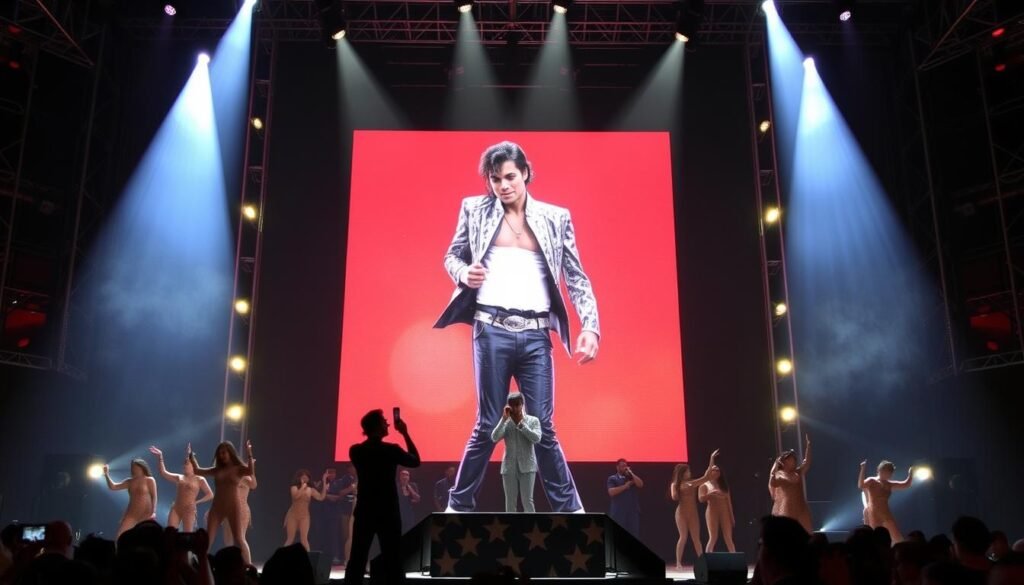
Commercial Success After Death
In the immediate aftermath of Jackson’s death, his music experienced a massive surge in popularity. In the year following his passing, his estate earned over $1 billion from album sales, music downloads, and various deals. His albums dominated the charts, with Thriller returning to the top 10 on the Billboard 200 and multiple greatest hits collections selling millions of copies worldwide.
This commercial renaissance has continued with several posthumous releases:
- Michael (2010) – The first posthumous album of previously unreleased material
- Xscape (2014) – A collection of reimagined unreleased songs, including the Justin Timberlake duet “Love Never Felt So Good”
- Scream (2017) – A compilation of Halloween-themed songs and remixes
- Thriller 40 (2022) – A 40th anniversary edition with previously unreleased demos
In 2016, Jackson’s estate sold its remaining stake in the Sony/ATV music publishing catalog (which included the Beatles catalog) for $750 million. In 2018, Sony acquired the Jackson estate’s stake in EMI Music Publishing for $287.5 million. In 2024, Sony Music acquired half of Jackson’s publishing rights and recording masters for an estimated $600 million—possibly the largest transaction ever for a single musician’s work.
Artistic Tributes and Cultural References
Countless artists have paid tribute to Michael Jackson through performances, samples, and stylistic homages. From Beyoncé and Justin Timberlake to Bruno Mars and The Weeknd, contemporary pop stars regularly cite Jackson as a primary influence and incorporate elements of his style into their own work.
Music Industry Impact
- Influenced generations of performers from Justin Timberlake to Bruno Mars
- Set standards for production quality and sonic innovation
- Established the template for the modern pop star
- Revolutionized music video as an art form
- Pioneered the mega-tour concert model
Dance Legacy
- Techniques studied in dance academies worldwide
- Influenced choreography across genres from hip-hop to contemporary
- Signature moves remain instantly recognizable globally
- Created a new standard for music performance
- Inspired dance competition shows and viral challenges
Cultural Representation
- Broke racial barriers on MTV and in mainstream pop
- Expanded global reach of American pop culture
- Influenced fashion trends for decades
- Established new possibilities for artist branding
- Created the template for the modern celebrity philanthropist
Jackson’s influence extends beyond music to other areas of entertainment and culture:
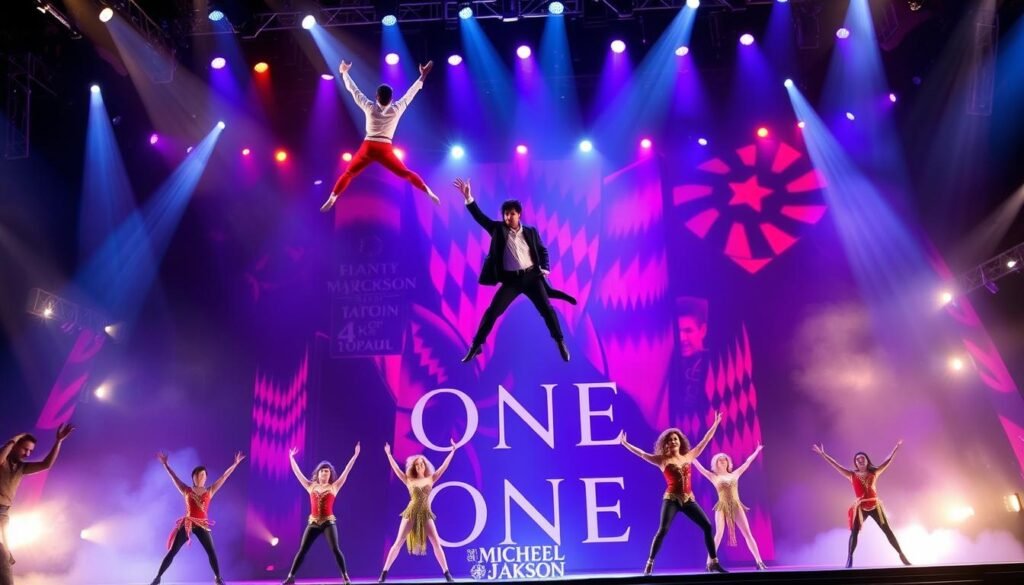
- Cirque du Soleil Shows – “Michael Jackson: The Immortal World Tour” and the permanent Las Vegas show “Michael Jackson ONE” have been seen by millions of people worldwide
- Broadway Musical – “MJ: The Musical” opened on Broadway in 2022, winning four Tony Awards including Best Leading Actor for Myles Frost’s portrayal of Jackson
- Biopic – “Michael,” a biographical film directed by Antoine Fuqua and starring Jackson’s nephew Jaafar Jackson, is scheduled for release in 2025
- Video Games – “Michael Jackson: The Experience” and other games have allowed fans to dance to his music
- Art Exhibitions – The National Portrait Gallery’s “Michael Jackson: On the Wall” exhibition explored his influence on contemporary art
Academic and Cultural Analysis
Jackson’s work and life have become subjects of serious academic study. Universities offer courses analyzing his contributions to music, dance, and visual culture. Scholarly books and articles examine his impact on race relations, gender performance, celebrity culture, and global pop. The Library of Congress selected the “Thriller” music video for preservation in the National Film Registry in 2009, recognizing its cultural, historical, and aesthetic significance.
“Michael Jackson’s influence on the musical landscape, on music videos, on dance, on promotion, on marketing, on PR, on everything—that’s really where the impact has been. He changed the world in so many ways that it’s hard to imagine the world of music without him.”
Digital Presence and New Media
Jackson’s legacy has adapted to the digital age with remarkable success. His official YouTube channel has billions of views, his music streams consistently on platforms like Spotify and Apple Music, and his social media accounts remain active and popular. The Michael Jackson estate has embraced new technologies to keep his presence alive, from hologram performances to virtual reality experiences.
This digital afterlife ensures that new generations continue to discover Jackson’s work. Children born years after his death know his music, recognize his dance moves, and understand his cultural significance—a testament to the enduring power of his artistry.
How has streaming affected Michael Jackson’s posthumous popularity?
Streaming platforms have played a crucial role in introducing Michael Jackson’s music to new generations. His catalog consistently performs well on services like Spotify, Apple Music, and YouTube, with songs like “Billie Jean,” “Beat It,” and “Thriller” regularly appearing in playlists and garnering millions of streams. The accessibility of streaming has allowed younger listeners to discover Jackson’s work outside of traditional album formats, ensuring his music remains relevant in the digital age.
According to Spotify data, Jackson regularly attracts over 30 million monthly listeners, placing him among the most-streamed legacy artists on the platform. His music experiences significant spikes around Halloween (due to “Thriller”) and during cultural moments that reference his work, demonstrating how digital platforms have created new contexts for experiencing his catalog.
What impact has Michael Jackson had on modern choreography?
Michael Jackson’s influence on modern choreography is profound and far-reaching. Contemporary choreographers across genres—from hip-hop to contemporary dance to K-pop—regularly incorporate elements of Jackson’s style, technique, and specific movements. His emphasis on precision, isolation, and storytelling through movement has become fundamental to commercial dance worldwide.
Many of today’s most successful performers, including Usher, Chris Brown, Justin Timberlake, and BTS, have explicitly cited Jackson as a major influence on their performance style. Dance competition shows like “So You Think You Can Dance” frequently feature Jackson-inspired routines, and viral dance challenges on platforms like TikTok often reference his iconic moves. Dance studios around the world offer classes specifically focused on Jackson’s techniques, ensuring his choreographic legacy continues to evolve with each new generation of dancers.
Experience the Broadway Magic of MJ: The Musical
See how Michael Jackson’s extraordinary life and revolutionary music continue to inspire audiences through the Tony Award-winning Broadway production.
The Eternal King of Pop: Michael Jackson’s Unmatched Legacy
Michael Jackson’s journey from child star to the King of Pop represents one of the most extraordinary careers in entertainment history. His unprecedented achievements—from the record-breaking success of Thriller to his revolutionary approach to music videos, from his innovative dance techniques to his humanitarian efforts—have secured his place as one of the most influential cultural figures of the 20th century and beyond.
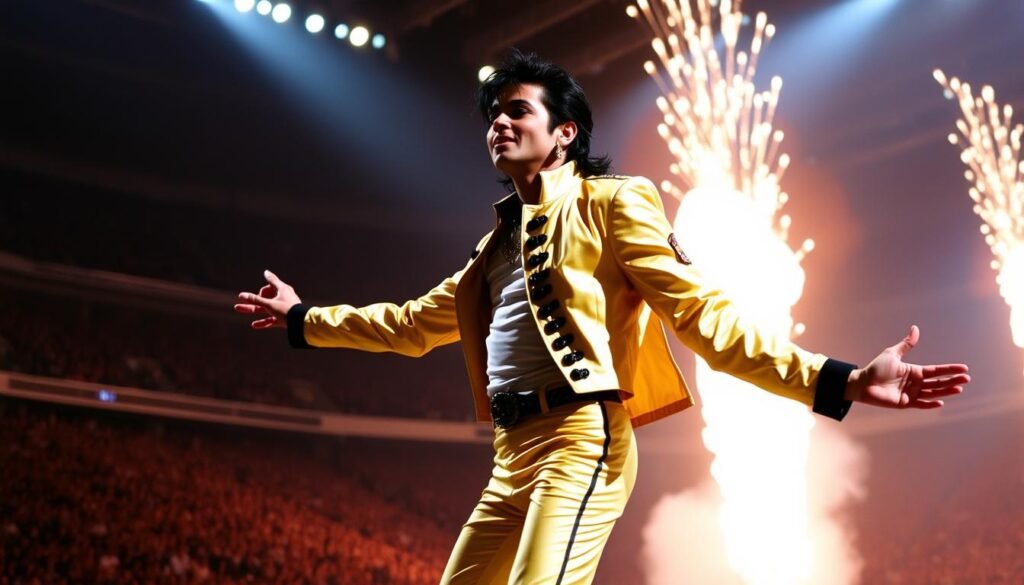
Jackson’s impact transcends music. He broke down racial barriers, transformed the possibilities of performance, revolutionized the music video as an art form, and set new standards for artistic ambition in popular entertainment. His influence can be seen in virtually every aspect of contemporary pop culture, from music production and choreography to fashion and visual storytelling.
- Estimated 500+ million records sold worldwide
- 13 Billboard Hot 100 #1 singles as a solo artist
- First artist to have a top 10 single in five different decades
- 8 Grammy Awards won in a single night (1984)
- 39 Guinness World Records, including “Most Successful Entertainer of All Time”
- Thriller: 70+ million copies sold worldwide
- $500+ million donated to charity during his lifetime
- 3 children: Prince, Paris, and Bigi (formerly Blanket)
- 2 Rock and Roll Hall of Fame inductions (Jackson 5 and solo)
- $2+ billion earned by his estate since his death
Michael Jackson: By the Numbers
The controversies that surrounded Jackson’s personal life have created a complex legacy that continues to be debated. Yet even as these discussions evolve, the power and influence of his artistic contributions remain undeniable. Few artists have changed the landscape of popular culture as profoundly as Michael Jackson, and fewer still continue to exert such a powerful influence years after their passing.
As new generations discover his work and artists continue to draw inspiration from his innovations, Michael Jackson’s status as the King of Pop remains secure. His music continues to be streamed by millions, his dance moves are still imitated worldwide, and his artistic vision continues to set the standard against which pop performers are measured. In the ever-changing world of popular culture, Michael Jackson’s legacy stands as a testament to the enduring power of artistic genius and the transformative potential of pop music at its most ambitious and visionary.
“When I think about Michael Jackson, I think about an artist who pushed the boundaries of what was possible in popular music. He wasn’t just a singer or a dancer—he was a complete artist who understood how to use every element of performance to create something truly transcendent. That’s why his work endures and why his influence will never fade.”
Discover the Complete Michael Jackson Collection
Explore Michael Jackson’s extraordinary musical journey from his early Jackson 5 days through his revolutionary solo career. Experience the artistry that changed music forever.

